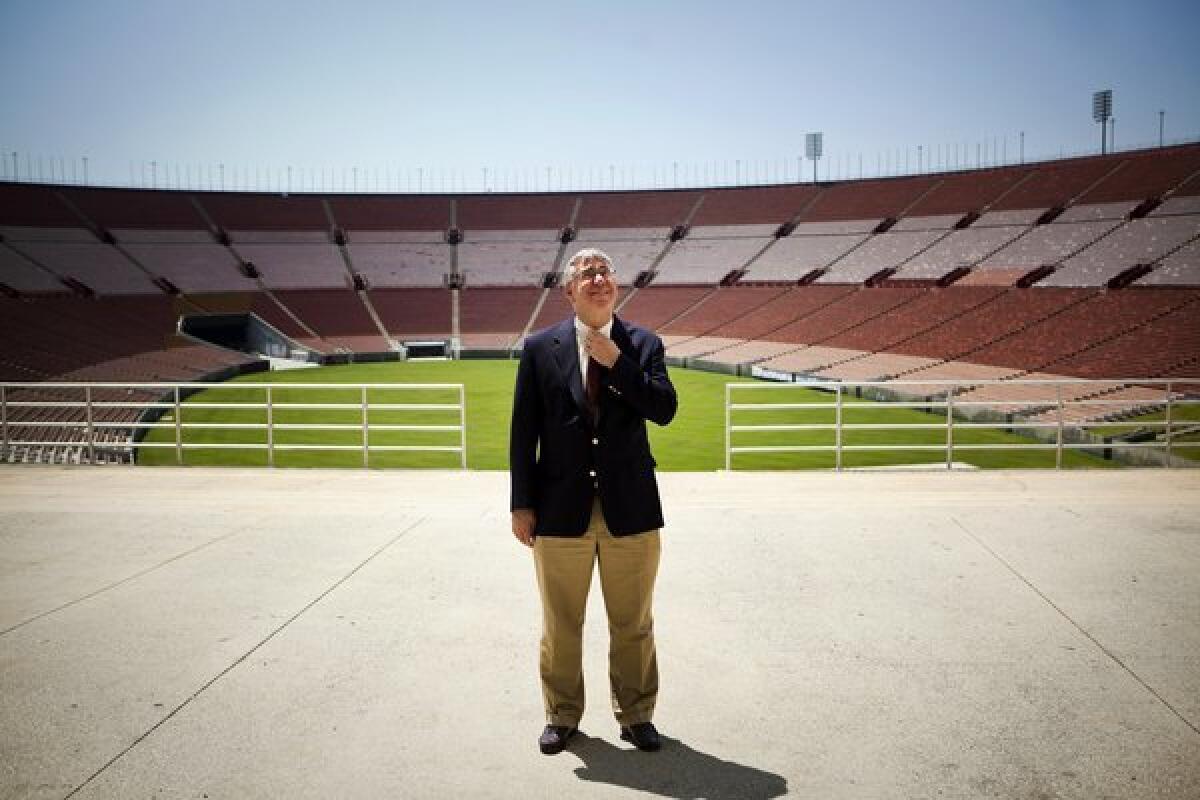Judge says Coliseum panel apparently violated open-meeting law

A judge Thursday said the Los Angeles Memorial Coliseum Commission appeared to have repeatedly violated the stateâs open-meeting law during its months of closed-door deliberations on USCâs lease of the taxpayer-owned stadium.
In pointed language, Los Angeles County Superior Court Judge Luis A. Lavin said he was prepared to issue an injunction against the commission that would restrict what it could discuss in secret sessions and require it to record all of its private meetings for three years.
Lavin said the commission had âdriven a Mack truck throughâ a narrow exemption in the Ralph M. Brown Act that could allow government bodies to exclude the public from certain lease deliberations.
He said the commission had an âaversionâ to conducting its business in public and singled out for criticism its interim general manager, John Sandbrook, who helped conduct the USC talks.
âI donât think Mr. Sandbrook has any interest in transparency,â Lavin said.
The judge made his remarks in connection with a lawsuit filed against the commission last year by The Times and a 1st Amendment group. He said he would issue a ruling as soon as Friday, including on whether the Coliseum improperly withheld documents The Times sought under the Public Records Act.
Lavin said, however, he was not inclined to void the recently signed USC lease because of any Brown Act violations. As a proposed remedy, The Times and Californians Aware asked him to order the commission to tear up the 98-year agreement, hold a public hearing on its terms and schedule a new vote.
The judge said he did not believe invalidating the lease would be necessary because the commissioners eventually released its proposed provisions and later took public comments before it was approved in May 2012.
Lavin also indicated that, because the commission updated and reapproved the lease earlier this year, rescinding the first agreement would have little practical effect. Times attorney Jeff Glasser argued that tossing out the 2013 lease would be an appropriate penalty because it is almost identical to the 2012 version.
In rebuking the commission, the judge noted that it entered into the USC talks without putting the proposed lease out to bid. âWeâre talking about a public asset being transferred to a private entity with no public bidding,â he said. âIt looks like this was a train on a track to get this to USC.â
The lease granted USC nearly total control of the Coliseum, the neighboring Sports Arena and their revenues. The private university, whose football team plays at the Coliseum, is not a party in the suit.
The commission is made up of representatives of the mayorâs office, the City Council, the county Board of Supervisors and Gov. Jerry Brown. In 2011, the panel decided to renegotiate its lease with USC after running out of money to pay for stadium upgrades it had promised the school.
That happened shortly after a scandal erupted at the Coliseum, following Times reports on financial irregularities. A resulting investigation by the Los Angeles County district attorneyâs office led to the indictment last year of three former Coliseum managers and three other people who did business with the commission.
During Thursdayâs hearing, Lavin said there was âundisputedâ evidence that the commission held many closed sessions on a range of lease provisions that should have been discussed publicly.
He cited a sworn statement from Councilman Bernard C. Parks, a commission member at the time, that the panel privately deliberated matters that went beyond what is allowed under the law for secret sessions. Generally, agencies can exclude the public only from deliberations that focus on the price and terms of payment of a lease.
Lavin questioned why, for example, the commissioners required secrecy to discuss the Coliseumâs calendar and a plan to give themselves free USC football tickets, a proposal later dropped after The Times reported on it.
âHow does event scheduling relate to price and terms of payment?â the judge asked. âOr 90 complimentary tickets to USC games?â
Coliseum attorney Deborah Fox said the commission and Sandbrook did their best to keep the public informed on the lease negotiations. Sandbrook did not respond to an interview request.
âThis idea of secrecy, I donât think holds true,â Fox said.
Regarding the documents The Times sought, Fox said the commission had a right to withhold a number of email exchanges between Sandbrook and USC. She said releasing them could hinder the panelâs defense if the school sued the agency.
âIâm not buying that,â Lavin said.
The judge also expressed skepticism about Foxâs statement that the commission did not give The Times a financial report for more than a year because it contained errors and was considered a draft exempt from disclosure. The report confirmed a pattern of poor financial oversight, extending to a sloppy accounting of hot dog sales.
Lavin said it appeared the panel was concerned that the report would be âembarrassing.â
âItâs called a draft report because you donât like it?â he said.
The suit asks that all the requested documents be ordered released. The Times and Californians Aware also have requested that the commission pay their legal fees.
More to Read
Sign up for Essential California
The most important California stories and recommendations in your inbox every morning.
You may occasionally receive promotional content from the Los Angeles Times.












